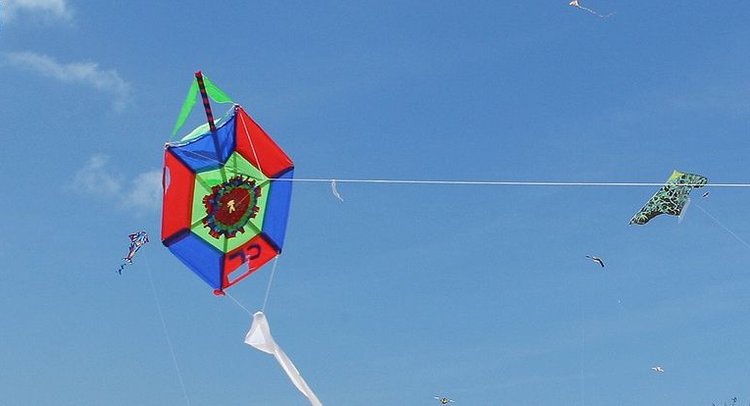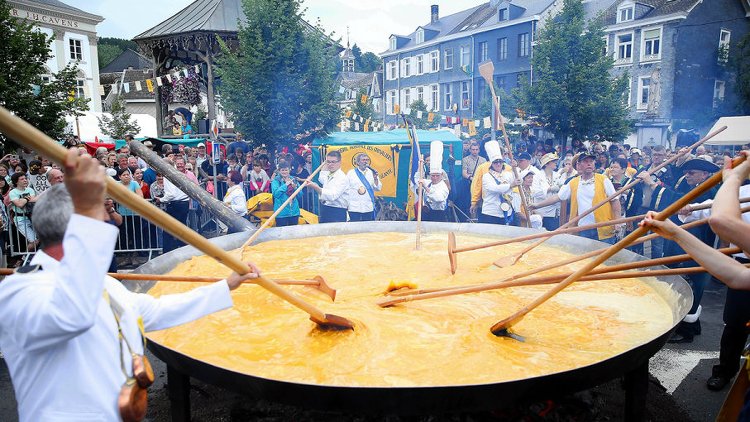9 ways to celebrate Easter around the world
While for most of us Easter is synonymous with eating chocolate, around the world there are an abundance of customs and traditions celebrated over the religious holiday. Despite our common ground at the core of the Easter tradition, being that Jesus rose from the dead after his crucifixion, not everyone around the world celebrates the holiday in the same way. From the making of giant omelettes in France to reading crime novels in Norway and even water fights in Poland. These are the 9 most intriguing traditions that take place around the world over Easter.

1. Kite flying in Bermuda
On Good Friday, Bermudian’s of all ages make their own kites from wooden sticks, colourful paper and a tissue called ‘hummers’ that makes a distinct sound when the kite is flown. People gather for the annual kite festival, where their creations are flown all together to fill the sky with colour and sound. The tradition is said to have begun when a local teacher used a kite as an example to help explain Christ’s ascension to Heaven to his school class.
2. Reading crime novels in Norway
The Påskekrimmen (or Easter Crime), is an annual Norwegian tradition celebrated over Easter, where locals read (however aren’t opposed to watching and listening to) crime and thriller stories over the holidays period. It all began in 1923 when a misunderstanding took place in Oslo as two students, who were accused of attempting to rob a train, simply wrote a book about it instead. Ever since, crime novels over Easter have been in great demand, even milk cartons have mysteries printed on their packaging for readers to solve. Want to travel to Norway? Find our tours of Norway here.
3. Water fights in Poland & Ukraine
Śmigus Dyngus is an Easter tradition observed in both Poland and the Ukraine. Wet Monday, as it’s translated occurs on Easter Monday and involves locals throwing water at each other. The tradition is connected to the baptism of a Polish Prince Mieszko on Easter Monday in 966 AD before it became a more playful game between friends. These days it’s a free for all, where everyone throws water at everyone and anyone. The weapons of choice include anything that can squirt water including water guns, empty household bottles, even a simple bucket of water will do. Interested in visiting Poland? See where we go.

4. Giant omelette making in France
In the south of France, over a thousand people in the town of Haux come together on Easter Monday to create a giant omelette. Using 4,500 eggs and over 100 pounds of bacon, garlic, and onions, the omelette is created in the town square and feeds thousands of people in the community. The ritual is said to have originated from French Emperor Napoléon Bonaparte who proclaimed he liked an omelette he once ate there and asked the townspeople for a giant one to feed him and his army. In the morning, families break the eggs in their homes and come together to cook the omelette to eat for lunch. Travel to France here!
5. Pot throwing in Greece
In the Greek island of Corfu, residents gather on Easter Sunday, at 11am (sharp) to throw old clay pots from their balconies. Pots of all shapes and sizes are thrown from any height onto the streets below, a tradition that dates back to the 16th Century. The ritual began when people would throw all of their useless and old belongings out of the window to get ready for the spring. Pottery in particular was believed to scare away evil spirits and mark a new beginning. The places you could go in Greece start here.
6. Go trick or treating in Sweden
Easter looks a lot like Halloween in Sweden as well as in other parts of Scandinavia. On the Thursday before Easter, children will dress up as witches and go trick or treating in their neighbourhood for sweets and treats. Legend has it that Swedish witches went to Blåkulla before Easter to party with the devil and to symbolise the witches’ journey, Swedes today will burn big bonfires in their honour. So, while the tradition has been adapted a little over the years, it marks as a fun time of year for all ages.
7. The rolling of the eggs in the United States of America
The annual Easter Egg Roll is performed on the south lawn of the White House each year, a tradition that dates back to 1878. Held on Easter Monday, the event is run by the First Lady of the United States and involves children racing from one end of the lawn to the other rolling coloured hard-boiled eggs with a large serving spoon. The event also involves live music, an egg hunt as well as arts and crafts. Want to travel to the US?
8. Egg tapping in Bulgaria
Bulgarians spend their Easter Sunday playing the Choukane s Yaitsa or egg tapping. This begins by two people standing opposite each other holding their hard-boiled eggs out in front of them. One holds their egg steady as the other person knocks it on the top with their own. The ultimate goal is to have the egg that is still intact at the end. Dating back from the 14th century, egg tapping plays an important role in the Easter tradition, especially when the winner is believed to have the best health that year. See our trips to Bulgaria.

9. Raising awareness of the endangered Bilby in Australia
In Australia, a marsupial Bilby rabbit is the animal of choice to represent the Easter period. This idea of swapping out the chocolate bunny rabbit for the chocolate Bilby rabbit was an initiative created by Rabbit-Free Australia back in 1991. The not-for-profit organisation launched a campaign to create chocolate Bilby’s to raise awareness of the endangered animal. All proceeds generated from Australians buying (and eating!) the chocolate Bilby go directly to help preserve the Bilby population. Check our tours to Australia.
Lexi is your ultimate wanderlust enthusiast with an incurable case of curiosity and a deep passion for action on climate change. You can read more of her work www.avaycay.com. Find her on Facebook or Instagram @avaycay.





